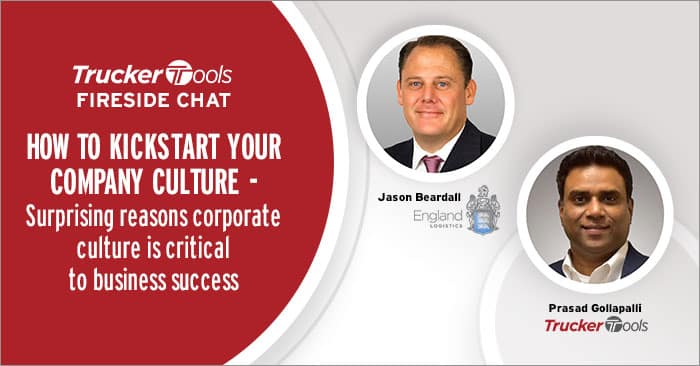In a recent Trucker Tools webinar entitled How To Kickstart Your Company Culture, Trucker Tools’ CEO and founder Prasad Gollapalli was joined by England Logistics’ president, Jason Beardall. Together, Gollapalli and Beardall have more than 35 years of experience in the transportation industry. In the webinar, the two discussed what company culture is, how to build a positive company culture and why company culture matters. Both also spoke about their respective company cultures and what’s been most effective for their organizations in creating a positive company culture.
What Is Company Culture?
When asked about how to define company culture, Beardall says that it looks a lot like how we each define our own personal core values when we’re not at work. He also noted that there is much more to company culture than casual Fridays and employee freebies.
“Company culture over time has become a little bit of a buzzword, which is unfortunate because it’s lost some of the criticality that it really deserves,” Beardall said. “People start thinking that it’s about free drinks, getting to wear jeans or bringing their dog to the office, but that’s not where culture lives and breathes. I would say company culture is the character of an company as defined by the core values of that organization. When I think about myself as an individual, I think of my desire to grow, develop and become better. A lot of that hinges upon how I define and want to define my personal character. I don’t think that differs from an organization as a whole.”
“Company culture over time has become a little bit of a buzzword, which is unfortunate because it’s lost some of the criticality that it really deserves,” Beardall said. “People start thinking that it’s about free drinks, getting to wear jeans or bringing their dog to the office, but that’s not where culture lives and breathes. I would say company culture is the character of an company as defined by the core values of that organization. When I think about myself as an individual, I think of my desire to grow, develop and become better. A lot of that hinges upon how I define and want to define my personal character. I don’t think that differs from an organization as a whole.”
Building a Positive Company Culture
Beardall pointed out during the webinar that every organization has a culture, whether it’s been deliberately fostered around specific core values or not. Doing nothing to create a positive company culture will define your company culture, said Beardall. As noted previously, knowing what your core values are is a good place to start.
“Company culture is a matter of defining what those core values are and then are we hiring people that are like-minded,” Beardall explained. “And I say that with great caution because it’s important to have people in your organization who think differently and to celebrate those differences because they contribute to idea-generation. But you have to be like-minded in what you present as your core values.”
Beardall went on to say that empowerment is a big part of England’s company culture and that the company has turned over the leading of that culture to its front line employees who are interacting with customers, vendors and partners the most. He explained that company culture cannot be created with a top-down approach by one person. Instead, it’s employees that represent a company the most often and that are the greatest contributors to company culture.
“A company culture can’t be led, it has to be embraced,” said Beardall. “When I think of our organization, I think of it as a family. I have eight children and I’ve been married for 25 years and I can’t lead core values within my family on my own. It has to be a collective action that together we define our core values, things that are important to us. We can teach them and be examples of those values, but we also want to solicit input from others. I don’t think culture is one and done.”
“A company culture can’t be led, it has to be embraced,” said Beardall. “When I think of our organization, I think of it as a family. I have eight children and I’ve been married for 25 years and I can’t lead core values within my family on my own. It has to be a collective action that together we define our core values, things that are important to us. We can teach them and be examples of those values, but we also want to solicit input from others. I don’t think culture is one and done.”
Why Company Culture Is Critical To Business
Success
One idea that Beardall came back to again and again during the webinar was the idea of creating a culture based on betterment — where employees feel like the possibilities are endless and where their personal betterment and development makes the company successful in ways that go beyond any metric.
“For some folks, Sunday night is a really tough, anxiety-filled night because they don’t love what they do and they’re not excited to get in on Monday morning,” said Beardall. “If that’s where you’re at, you should probably admit that you’re not in the right culture for yourself and that’s OK to voice and acknowledge. But get into a culture that you’re excited to say come Sunday night, ‘It’s been a killer weekend, but I’m ready to get back in the trenches with my teammates and I want to I want to go out and kill it.’ Finding those folks can be difficult, but if you can collect a quiverful that are also talented at the same time, you’re unstoppable. Nothing is going to slow your train down.”
For the rest of the discussion, watch the webinar How To Kickstart Your Company Culture. Schedule a free demo of Trucker Tools’ real-time visibility platform, digital freight matching and Book It Now®.






